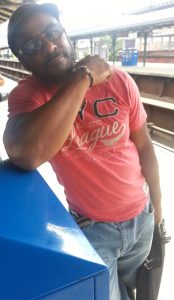
Greetings, everyone. Today, I have an interview with yet another author. I’d like to introduce you to Kahlil Koromantee, author of “Message to A YoungBlood.” Kahlil is an educator, and facilitator of workshops aimed at assisting students. He’s been hosted at Sister’s Uptown Bookstore and Cultural Center a number of times, and was at last year’s conference for the Association of Black Educators of New York. In this interview, he shares what inspires him to write, as well as passing along advice for aspiring writers.
Polite On Society: Could you tell us a little bit about yourself and where you’re from?
Kahlil Koromantee: As with all immigrants, my Haitian parents came to the States for better opportunities. Brooklyn would be the first of several cities I was raised in, including Paris and Montreal, thanks to having a father who saw to it that my definition of what Black looks, sounds and acts like was much broader than what I was being exposed to within my immediate surroundings. That in itself helped shape my beliefs on the importance of Black youth being able to see beyond their circumstances. Writing became a way of self-investigation, to me. It didn’t turn into an art form until later in my adult life when I saw the benefits of writing motivational books I couldn’t find for hard to reach youth.
POS: You have a saying that I really admire: “I write books that I can’t find.” Could you explain why that is your outlook as an independent author?
KK: It’s a statement that pretty much sums up my mission as a writer; more specifically, a writer of youth motivational books. As a former Secondary Education English teacher, I know what it’s like for a well-intended teacher to want to bring in material that addresses the social and ethnic realities of her or his classroom. As a Life Coach working with either college students or the incarcerated, it’s an even more of a challenge to find intervention tools that address the realities of my populations. So this is what I mean when I say I write books that I can’t find. It’s not some interesting phrase that I use for marketing purposes. It’s the honest truth. Because of the youth populations I tend to focus on, as well as my think out the box approach to academic and personal intervention, authors like myself tend to be put in the category of ‘alternative thinking’ or ‘alternative education’.
But when you look around you, alternative is the new reality. Young people, especially, are coming into the classroom and counseling office with struggles that don’t fit into predictable formulas given to graduate students. What school and university administrators are still learning to catch up on, our teens and young adults are already expressing in various ways. What I offer is merely reading material that directly addresses the everyday lives of marginalized, under-represented youth. I also write in a manner that makes the young reader and their parent or guardian the focus of the intervention and not like a dissertation that’s so cerebral that it goes over the head of the very person the message is intended for. So many scholars write books that appeal to their research peers but not the person they’re supposed to be talking to. This is why all my youth motivational books are more like conversations I’m having with our daughters and sons, as opposed to talking about or passed them. The are other projects I plan on tackling, at some point, that address, for example, Alzheimer’s in the Black community. Something I’m seriously considering taking on. But in the meantime, I’m staying on mission.
POS: In addition to writing books, you also host workshops. How does literacy inform your work in the community?
KK: I offer workshops that utilize my books as part of the intervention. I also do academic workshops that address the many obstacles that keep a great student from being great. It depends on what I’m asked to focus on and in what context. But they always answer to an apparent need i see or presented to me. Black kids enjoy reading. They just shutdown as early as third grade once they realize that the educational system they’re in is more interested in teaching them how to fit into standardized testing regiments, rather than how to nurture their sense of originality. This is why it’s extremely important that Black parents continue the education process in the home by pushing critical thinking skills, self-actualization exercises and, if at all possible, traveling to other parts of the state, country or world to develop a broader sense of citizenry and consequently a deeper sense of self.